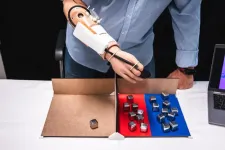(Press-News.org) CHAPEL HILL, N.C. – UNC School of Medicine researcher Sarah Cohen, PhD, and Ian Windham, a former PhD student from the Cohen lab, have made a new discovery about apolipoprotein E (APOE) – the biggest genetic risk factor for late-onset Alzheimer’s disease.
Older people who inherited a genetic variant called APOE4 from their parents have a two- or three-times greater risk of developing the late-onset neurodegenerative disease. If researchers can better understand how APOE4 is affecting brain cells, it may help them design effective therapeutics and target the mechanisms causing the enhanced disease risk.
Cohen and Windham performed an exceptionally thorough, five-year long study to better understand and visualize the relationship between APOE4, Alzheimer’s Disease, and fat molecules called lipids in the brain.
“We discovered that brain cells known as astrocytes are more vulnerable to damage and may even go dysfunctional when APOE4 surrounds their lipid storage centers,” said Cohen, assistant professor of cell biology and physiology and senior author on the paper published in the Journal of Cell Biology. “This mechanism could explain why exactly APOE4 increases one’s risk of Alzheimer’s on the cellular level.”
The Role of Lipids in the Brain
Sixty percent of the brain’s dry mass is composed of lipids, which play important roles in the brain, such as storing cellular energy and forming myelin, the substance that surrounds and insulates neurons. Lipids can be found in specialized fat storage compartments known as lipid droplets within astrocytes.
As helpful as they may be, lipids can also become toxic if the conditions are right. When excited or stressed, neurons release toxic lipids into the environment. Astrocytes are tasked with cleaning up the free-floating toxic lipids and preventing them from accumulating in the brain.
If astrocytes were to become damaged or dysfunctional in any way, they cannot perform their cleaning duties. As a result, other brain cells, called microglia, cannot clean up amyloid beta plaques in the brain either, another driving factor for Alzheimer’s disease.
Seeing APOE in Real Time
APOE is produced by astrocytes. Much like a taxi or Uber, the protein oversees the releasing and transporting lipids between cell types in the brain. Windham and Cohen wanted to see what exactly happens with the lipids in the astrocytes. Windham led the charge, creating a labelling and tagging system that would allow them to see the innards of astrocytes in action under the microscope.
“Tagging APOE with green fluorescent protein allowed us to see the different places APOE goes while inside living cells,” said Windham, now a postdoctoral fellow at The Rockefeller University and first author on the paper.
The team first fed astrocytes oleic acid, an omega-9 fatty acid naturally produced in the body. Using a microscope, the team observed the usual formation of lipid droplets. APOE4, surprisingly, zipped over to the lipid droplets like a magnet and changed the shape and size of the droplets.
It became abundantly clear to the researchers that APOE4 can escape secretion, lock itself inside astrocytes, and migrate to lipid droplets within astrocytes. Windham and Cohen hypothesize that the altered composition of the lipid droplets could be causing astrocyte dysfunction and affecting the microglia’s ability to clear amyloid beta.
Lipids: The Next Frontier
However, more research needs to be done to know the specifics. Cohen hopes their findings will further emphasize the role of lipid droplets in Alzheimer’s disease and other neurodegenerative diseases.
“In Alois Alzheimer’s first paper, he described three characteristics of neurodegenerative disease: amyloid beta plaques, tau tangles, and accumulations of lipids,” said Cohen. “The first two have gotten a lot of attention. The next frontier is lipids. With APOE being the biggest genetic risk factor, we think it holds the clues for how lipids fit into the story.”
About UNC School of Medicine
The UNC School of Medicine (SOM) is the state’s largest medical school, graduating more than 180 new physicians each year. It is consistently ranked among the top medical schools in the US, including 5th overall for primary care by US News & World Report, and 6th for research among public universities. More than half of the school’s 1,700 faculty members served as principal investigators on active research awards in 2021. Two UNC SOM faculty members have earned Nobel Prize awards.
# # # #
END
In the treatment of aggressive lymphomas and blood cancer (leukaemia), so-called chimeric antigen receptor T cells (CAR T cells) are increasingly being used. For this therapy, immune cells are taken from patients and programmed by means of genetic engineering to detect proteins on the malignant tumour cells. Back in the body, the CAR T cells then fight the cancer cells. Due to some heavy side effects, this therapy requires extreme caution and long hospital stays. Scientists at University Hospital Cologne are therefore researching ...
Acting on a proposal from the Institut Pasteur President Yasmine Belkaid, the Institut Pasteur Board of Governors appointed Mariana Mesel-Lemoine as Director of Diversity, Equity and Inclusion on Wednesday February 7, 2024.
This appointment marks a significant milestone in the history of the Institut Pasteur, and it is the first French research institute to establish a position of this kind at such a senior and strategic level. Mariana Mesel-Lemoine will report directly to the President. Her mission will be to propose policy and strategy priorities related to diversity, equity and inclusion for the "Pasteur 2030" Strategic Plan, to oversee ...
About The Study: In hospitals participating in Get With The Guidelines–Stroke, earlier anticoagulation reversal was associated with improved survival for patients with intracerebral hemorrhage. These findings support intensive efforts to accelerate evaluation and treatment for patients with this devastating form of stroke.
Authors: Kevin N. Sheth, M.D., of the Yale University School of Medicine in New Haven, Connecticut, is the corresponding author.
To access the embargoed study: Visit our For The Media website at this ...
Sleep apnea is prevalent among cardio-oncology patients who are at higher risk for congestive heart failure from cancer therapy, according to a new study being presented at the American College of Cardiology (ACC) Advancing the Cardiovascular Care of the Oncology Patient course.
Sleep apnea is a disorder of altered breathing while asleep with two types, obstructive (OSA) or central (CSA). Both can be treated to alleviate symptoms and improve cardiovascular outcomes. This study pertains to obstructive sleep apnea. A well-established screening tool for detecting sleep apnea is the STOP-BANG questionnaire utilizing eight questions using ...
Since December 2019, severe acute respiratory syndrome coronavirus 2 (SARS-CoV-2) has posed a worldwide threat. The emergence of the BA.2.86 variant, a subvariant of Omicron, has raised significant concerns due to its substantial number of mutations. Discovered in August 2023, this variant differs markedly from other existing types such as Omicron XBB (including EG.5.1 and HK.3). Compared with XBB and BA.2, BA.2.86 exhibits more than 30 mutations in its spike protein, contributing to its ability to effectively evade the immune system’s defenses.
Over ...
Sensory feedback is important for amputees to be able to explore and interact with their environment. Now, researchers have developed a device that allows amputees to sense and respond to temperature by delivering thermal information from the prosthesis’ fingertip to the amputee’s residual limb. The “MiniTouch” device, presented February 9 in the journal Med, uses off-the-shelf electronics, can be integrated into commercially available prosthetic limbs, and does not require surgery. Using the thermally sensitive prosthetic hand, ...
Pisa, 9 February 2024. “When one of the researchers placed the sensor on his own body, I could feel the warmth of another person with my phantom hand. it was a very strong emotion for me, it was like reactivating a connection with someone”.
Thanks to a sensorised prosthetic hand that provides realistic and real-time thermal feedback, Fabrizio, a 57-year-old man from Pistoia with a transradial (wrist) amputation, was able to discriminate between and manually sort objects of different temperatures or materials and ...
The past year has seen major advances in Large Language Models (LLMs) such as ChatGPT. The ability of these models to interpret and produce human text sources (and other sequence data) has implications for people in many areas of human activity. A new perspective paper in the journal Neuron argues that like many professionals, neuroscientists can either benefit from partnering with these powerful tools or risk being left behind.
In their previous studies, the authors showed that important preconditions are met to develop LLMs that can interpret and analyze neuroscientific data like ChatGPT interprets language. These AI models can be built for many different types ...
About The Study: This study including 202,000 veterans with COVID-19 and 202,000 matched uninfected veterans found that outpatient use increased significantly in the month after infection, then attenuated but remained greater than the uninfected cohorts’ use through 12 months, which suggests that there are sustained impacts of COVID-19 infection.
Authors: Matthew L. Maciejewski, Ph.D., of the Durham Veterans Affairs Health Care System in Durham, North Carolina, is the corresponding author.
To access the embargoed study: Visit our For The Media ...
About The Study: The findings of this study including 133 adults with severe obesity suggest that bariatric surgery was associated with health benefits two years after surgery. Bariatric surgery was associated with improved cognition and general health and changed blood vessel efficiency and cortical thickness of the temporal cortex. These results may improve treatment options for patients with obesity and dementia.
Authors: Amanda J. Kiliaan, Ph.D., of the Radboud University Medical Center, Donders Institute for Brain, Cognition, ...





